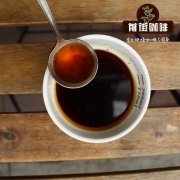Kenyan Coffee output Kenyan Coffee extraction parameters how Kenyan Coffee flushes out berry flavor

Professional coffee knowledge exchange More coffee bean information Please pay attention to coffee workshop (Weixin Official Accounts cafe_style)
In 1893, Scottish missionary John Patterson introduced coffee to Kenya. The coffee seed was reportedly obtained from Smith Mackenzie, an agent of the British East India Company in the Yemeni port city of Aden. It is then seeded in Kibwezi near Mombasa, Kenya. The year 1896 marked the harvest of the first planting and the introduction of coffee into the fertile Kiambu-Kikuyu region for the first time. By 1912, large coffee estates of hundreds of acres had been established around Kiambu-Kikuyu, growing mainly Kent and bourbon varieties. When Kenya became independent in 1963, Kenya already had a reputation for producing the best quality coffee in the world.
Most coffee in Kenya is sold through an auction system sponsored by the Kenya Coffee Board. Private marketing services and exporters purchase high-quality lots through these auctions and collect samples of available lots in advance. Atlas acquired the high quality of these auction items through our exporter partners, but it was only recently that we were able to work more directly with the growers of our favorite Kenyan coffee and lay the foundation for a long-term personal connection.
Traceable Kenyan coffee can come from privately owned estates or from cooperatively-managed washing stations commonly referred to as "factories." "Factories are usually organized in society, much like the cooperatives organized under associations in Latin American coffee-producing countries. While private estates have had the ability to sell coffee directly to buyers for some time, exporters are able to sell coffee directly from individual washing stations (factories) to buyers, a relatively new development. Atlas procurement is currently concentrated in only a few farmer cooperatives (FCS). In Nyeri district, we often work with Othaya and Rumukia communities, while in Murang a district, we recently started sourcing from Kariua and Gatunyu Kigio communities.
Fortunately, Atlas has strong social development partners in Kenya. Since 2016, we have partnered with the University of Washington Tree Project and the Aga Khan University Hospital in Nairobi to establish a mobile women's health clinic in coffee-producing communities in Neri, Muranga and Embu counties. For more information, visit our news page to learn how cervical cancer screening is supported for women farmers through our Farmer Health Program.
Unique to East Africa is a letter size grading system. Screen size is measured in 64th of an inch. AA is the largest size level and consists of beans with screen size 17 and 18. "AB" for 15/16 screen,"C" for 14/15 screen,"PB" for small flower beans. Even today, larger screens bring higher auction prices, and many international markets prefer coffee beans with larger screens. We found no absolute correlation between bean size and cup quality, which is why a lot of the coffee we serve in Kenya is AB and PB grade.
Kenyan coffee is considered to be of the highest quality in the specialty coffee circle. Its sweetness, complexity and acidity are unmatched in other coffee-growing regions. Fruity aromas range from citrus (grapefruit, orange) to stone fruit (peach, apricot) to blackberry (blackberry, blackcurrant) and everything in between. The diversity of Kenyan coffee is one of the attractions of the country of origin. At Atlas, we offer a range of coffee styles to showcase Kenya's best coffee.
END
Important Notice :
前街咖啡 FrontStreet Coffee has moved to new addredd:
FrontStreet Coffee Address: 315,Donghua East Road,GuangZhou
Tel:020 38364473
- Prev

What's so special about the taste of Rosa coffee? share the taste of Rose Xia Shouchong.
Professional coffee knowledge exchange more coffee bean information please pay attention to the coffee workshop (Wechat official account cafe_style) front street-jadeite manor green rose proportion sharing rose summer (Geisha), a subspecies of coffee, belongs to Arabica species, rich jasmine, light citric acid, roasted sweet potato, bergamot, white grape and other flavors, make it very tasteful, in recent years, boutique coffee industry
- Next

Malawian Coffee production Malawian Coffee producing areas introduce what coffee producing countries in Africa
Professional coffee knowledge exchange more coffee bean information please follow the coffee workshop (Wechat official account cafe_style) Gatunyu Kigio Farmers' Cooperative (FCS) is headquartered in Gatanga County, Mulan County. The association was registered on November 20, 1995 and includes the following coop plants in Kiambu and Muranga counties: Gakurari Muchai Gichamuri Wambaru Atlas from G.
Related
- Beginners will see the "Coffee pull flower" guide!
- What is the difference between ice blog purified milk and ordinary milk coffee?
- Why is the Philippines the largest producer of crops in Liberia?
- For coffee extraction, should the fine powder be retained?
- How does extracted espresso fill pressed powder? How much strength does it take to press the powder?
- How to make jasmine cold extract coffee? Is the jasmine + latte good?
- Will this little toy really make the coffee taste better? How does Lily Drip affect coffee extraction?
- Will the action of slapping the filter cup also affect coffee extraction?
- What's the difference between powder-to-water ratio and powder-to-liquid ratio?
- What is the Ethiopian local species? What does it have to do with Heirloom native species?

